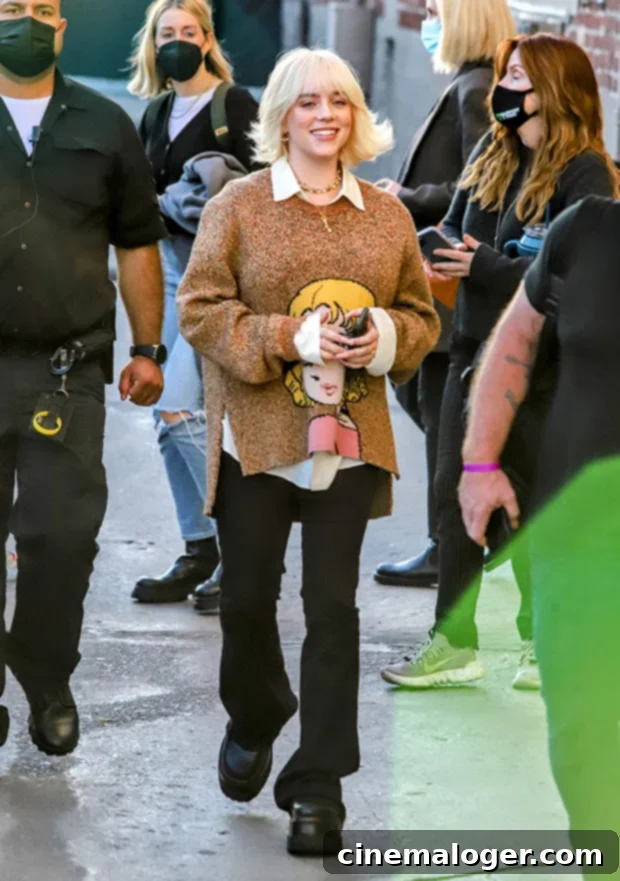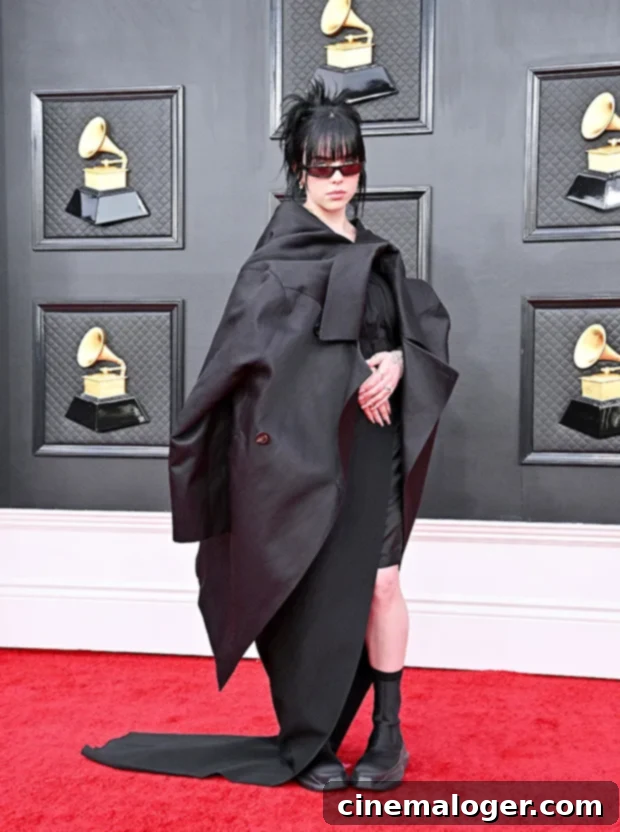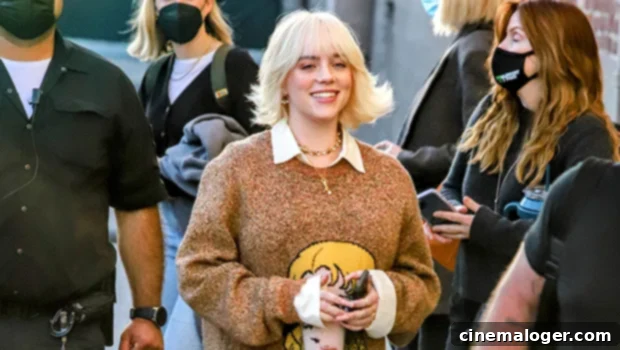Billie Eilish Navigates the Digital Age: Unpacking Social Media’s Impact and the Dangers of Online Misinformation
Global music phenomenon Billie Eilish, at just 21 years old, has openly revealed her complex and often challenging relationship with the internet and social media, culminating in her decision to completely remove these pervasive applications from her phone. During a candid conversation on an upcoming episode of Conan O’Brien’s popular podcast, Eilish, who commands an immense online presence with over 100 million followers on platforms like Instagram, elaborated on why she no longer actively engages with social media. “I’ve deleted it all off my phone, which is such a huge deal for me,” Billie shared, underscoring the significance of this digital detox in her life. She poignantly contrasted her upbringing with Conan’s, noting, “Cause dude, you didn’t have the internet to grow up with,” highlighting the profound generational divide in experiencing the digital world.
Joined on the podcast by her older brother and frequent music collaborator, Finneas O’Connell, Billie delved deeper into her formative years and how the internet played a role in her development. Her reflection offers a unique perspective on growing up alongside technology. “For me, it was a big part of – not my childhood, I wasn’t an iPad baby, thank god,” she clarified, expressing gratitude for having a childhood less tethered to screens than younger generations. Eilish believes she experienced the internet at an “ideal” evolutionary stage, one that allowed her to benefit from its nascent offerings without being consumed by its omnipresence. “I feel like I grew up in the perfect time of the internet that it wasn’t so internet-y, that I didn’t have a childhood,” Billie explained. “I had such a childhood, and I was doing stuff all the time. And it was like computers and games on computers, but barely.” This sentiment resonates with many who experienced the shift from pre-digital childhoods to an increasingly connected world, enjoying a balance between real-world interactions and early digital explorations.

Finneas, 25, affirmed his sister’s recollections, emphasizing that both siblings spent a considerable amount of time outdoors during their early years. “We were outside,” he confirmed. Billie expanded on this, detailing the gradual integration of technology into her life. “We were doing stuff,” she reiterated. “And then when I became a pre-teen, there were iPhones, and I got a little older, there was all of what has become.” This period marked a significant shift, as mobile technology and social media platforms began to take root and transform adolescent social dynamics. Eilish found herself immersed in this evolving digital landscape, becoming a true “internet kid” during her formative pre-teen and teenage years. “But then being a pre-teen and a teenager on the internet, those were my people, I was one of them. I was one of those people on the internet,” she reflected. This deep immersion allowed her to connect with peers and explore interests in ways previously unimaginable, shaping her identity within online communities. “And then within myself feel like nothing changed, but suddenly I’m doing what I’ve always done, in looking at the internet because I’m an internet kid.” However, as her career skyrocketed, this innate digital engagement took on an entirely new and often perilous dimension.
The transformation of Billie’s relationship with the internet became acutely apparent once she achieved widespread fame. What was once a space for connection and self-expression quickly devolved into a platform for intense public scrutiny and, at times, baseless negativity. Eilish candidly shared the disturbing reality of encountering hateful content directed at her online. “I was with my boyfriend, Jesse Rutherford, the other day and this video came up and it was like, ‘Billie Eilish is a horrible person,’” the “Bad Guy” hitmaker recounted, illustrating the personal impact of such pervasive online criticism. “And then it was like a very serious video of why. And the person seemed very in the right headspace. And they were saying all these things. It’s just funny, it’s such a crazy reality that I live in.” This experience highlights the disorienting nature of fame in the digital age, where strangers can confidently dissect and condemn a public figure’s character based on skewed or fabricated narratives, leaving the subject feeling bewildered by the stark contrast between their reality and the online portrayal.

Beyond the personal attacks, Billie Eilish expressed profound concern over another insidious aspect of the internet: its ability to foster gullibility and spread misinformation. “That’s the other thing that freaks me out about the internet is how gullible it makes you,” Billie confessed, articulating a sentiment many individuals and experts share regarding the digital landscape. She admitted to a startling personal vulnerability: “Anything I read on the internet, I believe. Me. I know for a fact that’s stupid, and I shouldn’t do that because I have proof it’s not all true. Almost none of it’s true.” This raw honesty from a global icon is particularly telling. If someone like Eilish, who is frequently the target of online fabrications and understands the mechanisms behind them, can still fall prey to believing what she reads, it speaks volumes about the pervasive and deceptive power of online narratives. The internet’s structure, with its echo chambers, personalized algorithms, and rapid dissemination of information, often blurs the lines between fact and fiction. It cultivates an environment where sensationalism can overshadow veracity, making critical discernment increasingly difficult even for those who know better. This inherent flaw in the digital ecosystem highlights a significant challenge for individuals navigating vast amounts of unverified content and underscores the urgent need for digital literacy and critical thinking skills in the modern age.
In response to these overwhelming digital pressures and the constant influx of both negative attention and unreliable information, Billie has consciously chosen to step back and embrace a life less dependent on screens. Her decision to delete social media applications from her phone is a testament to her commitment to mental well-being and a more authentic existence. Since last fall, she has been enjoying a fulfilling relationship with her boyfriend, Jesse Rutherford, a connection that appears to thrive away from the incessant demands and public gaze of social media. The couple’s happiness serves as a poignant example of the positive outcomes that can stem from a digital detox. Moreover, Eilish continues to channel her energy into her thriving musical career, captivating audiences worldwide with her “Happier Than Ever, The World Tour.” With an extensive schedule spanning North America, South America, and Europe from March 17 to August 27, her focus remains firmly on her artistic endeavors and real-world connections, demonstrating that a vibrant and successful life can indeed be lived beyond the confines of the digital realm.
Billie Eilish’s journey offers a vital commentary on the contemporary celebrity experience and the broader societal implications of our increasingly digital lives. Her candid discussion on Conan O’Brien’s podcast serves as a powerful reminder of the delicate balance between leveraging the internet for connection and creation, and protecting oneself from its darker, more destructive elements. By sharing her struggles with online negativity and the pervasive issue of misinformation, Eilish not only advocates for digital well-being but also prompts a wider conversation about media literacy, critical thinking, and the importance of fostering genuine connections in an era defined by constant digital noise. Her path exemplifies a growing trend among public figures and individuals alike who are re-evaluating their relationship with technology, choosing intentional disengagement in pursuit of greater peace, authenticity, and sustained creative output.
